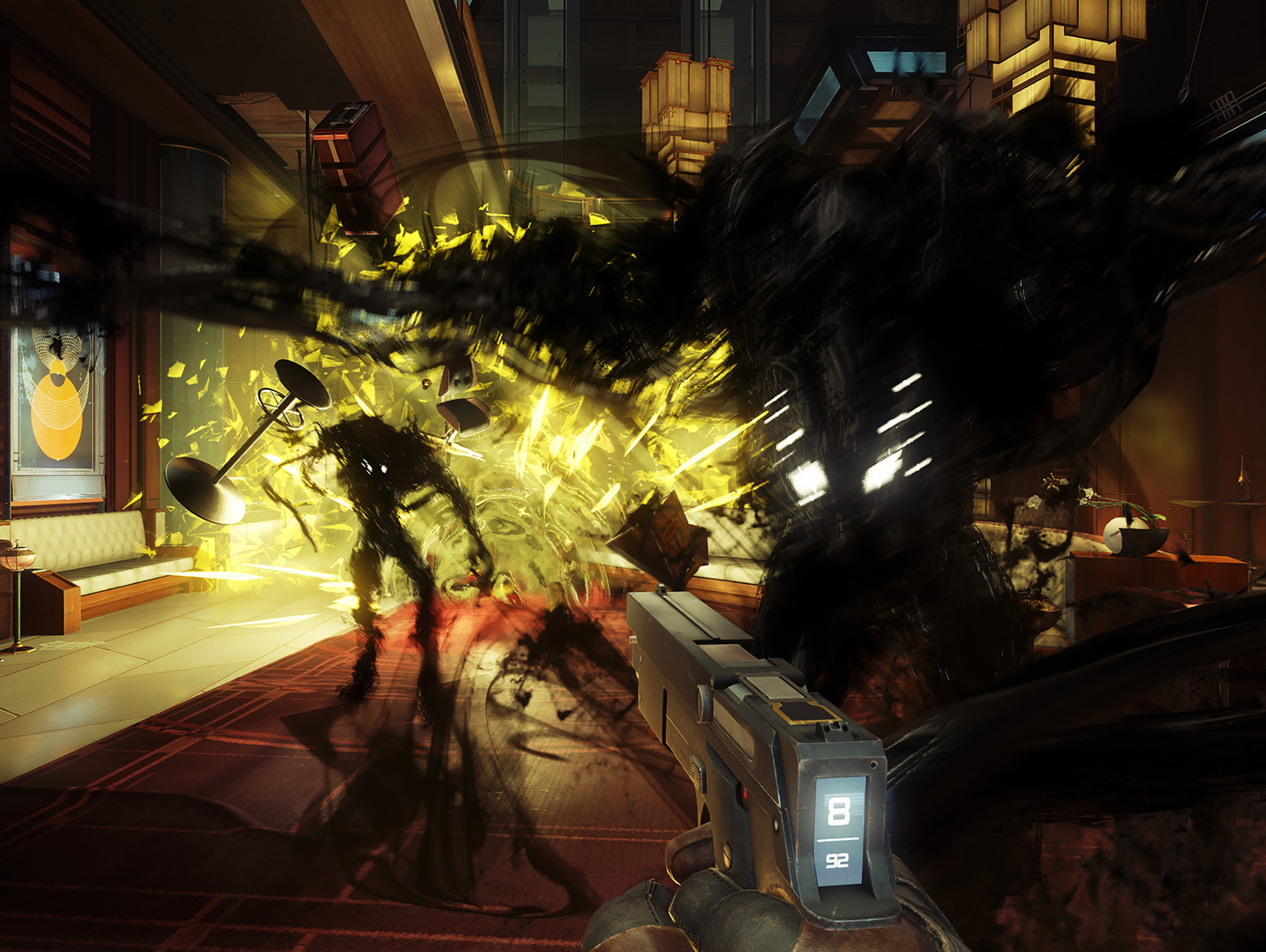Platforms:
Xbox One, PS4, PC
Released:
May 5, 2017
Publisher:
Bethesda Softworks
Developer:
Arkane Studios
Operating as a re-boot of an 11 year old game, Prey (2017) is an intriguing and well-crafted delve into an alternative future where space exploration is a larger priority to mankind.
The game takes place on Talos I, a space station being used to research a hostile alien species known as the the Typhon. Playing as Morgan Yu (either male or female), you awake on Talos I and begin quickly discovering that things are going terribly wrong. The Typhon have broke containment, many of the researchers and workers upon Talos I have been killed, and you have lost your memories thanks to certain experimentation that raises a lot of questions about your role within the hierarchy of Talos I and who you can and can not trust.
Developed by Arkane Studios, Prey’s gameplay and environments take a lot of inspiration from other games, most notably the Bioshock or System Shock franchises. The game functions as an FPS, RPG and horror hybrid with a lot of influences from other genres impacting the way you can play. The environment is mostly open with some areas blocked off until certain story beats have been reached or until you have acquired the necessary power to get through.
Prey has a lot of great things to offer to any player thinking of picking up this title, although it isn’t without its flaws. Having said that, the ways in which Prey excels can be staggering at times and I would struggle to think of a person I wouldn’t recommend this game to.

The enemy design is perfectly on point for a horror experience. In fact, the mimics may be one of the best horror game foes I have ever come across. Their ability to disguise themselves within the environment and jump out at you at any given moment is genuinely tense. Walking into a new environment and being unaware of which prop if any is a Mimic creates really interesting implications. That chair looks slightly out of place, or there seems to be one too many coffee mugs at that desk. These thoughts can lead to paranoia which can lead to wasting precious ammunition on inanimate objects. Getting sprung by a well hidden Mimic as the shrill sounds of the game explode out of the silence has impact. At one point in the game you are given a power that essentially allows you to scan for Mimics – don’t use it, you are removing one of the best aspects of this game.
Matching the Mimics in ability to impress me was the game’s “Looking Glass” technology. Already spoiled by the game’s promo footage, the Looking Glass technology is a glass pane that projects an accurate simulation, no matter what angle you observe it from. The looking glass tech blends in perfectly with the environment. A window that looks out onto a cityscape can be smashed to discover no such cityscape exists. A fish tank built into a wall may not actually exist at all.
“It’s incredibly clever and leads to moments of jaw-dropping awe”
What is so fantastic about this is you never really know when the looking glass tech is coming into play. The game doesn’t throw it in your face and constantly finds ways to surprise you with the simulation, even when you’re completely aware of its existence. It’s incredibly clever and leads to moments of jaw-dropping awe.
The world design is also on point. The space station you’re exploring feels real in the best of ways. It’s all the small details and extra effort that obviously went in to meticulously crafting this game that is so impressive. Any sign you walk past, any email you skim over, every character that exists, even those that are dead or possessed, has a reason for existing. The world feels like a a real, lived-in space. The slower you explore the environments around you, the more finite of details you will uncover and the greater your appreciation of the game’s design will grow. Also… Prey just looks phenomenal, I guess that needs to be said.

prey also offers some really great mechanics to the player. The GLOO cannon is one of my personal favourite weapons that an be used to glue up enemies, stopping them in their tracks and leaving them vulnerable to a good ol’ wrench smack. The GLOO cannon has gameplay implications beyond combat as well, allowing you to glue up a gas leak, or create gluey blobs for you to platform off. While this diversity of use is fantastic, the platforming in Prey (including the platforming created thanks to the GLOO cannon) doesn’t feel accurate or fun. It feels like the standard type of platforming awkwardness you’d expect from a first-person game.
Neuromods are also a really cool gameplay addition to Prey, allowing you to boost specific attributes or gain abilities. This isn’t necessarily new territory for video games, but when harnessing alien abilities comes into play, it really grows into something special. Taking the Mimic’s ability to morph into any prop in the environment is as stupidly fun as it sounds, and much like everything else in Prey, this ability has more implications than you may think.
I’m going to finish my line of praise for Prey by pointing to how well recycling and fabrication worked in the game. As you explored the environment you will pick up items of varying worth: ammo, health, weaponry, junk. Those items can be placed into a recycler and broken down into one of four components. Those components are then used to fabricate new items such as ammo, health or Neuromods. The system works fantastically but it also forces the player to define what they find most valuable. No doubt ammo and health are great, but Neuromods are essentially skill points in this game, and crafting anything removes components that you may need to craft something else.
Whilst Prey is seriously good in all these ways and more, I can’t avoid discussing its downsides any longer.
“Wanting to take on aspects of multiple genres, Prey never really hones in on a singular experience, and it’s to its own detriment”
The biggest issue I ran into with Prey actually stems from its variable gameplay. Wanting to take on aspects of multiple genres, Prey never really hones in on a singular experience, and it’s to its own detriment. By providing so many options for the way in which players can engage with the game, it’s unable to commit itself to going all out on any one play-style. It actually took some time for me to figure out how I wanted to engage with Prey, constantly looking for what I was missing to make the journey from one story beat to the next more enjoyable. Stealth in Prey was a particularly lacklustre experience, the gun-play was okay, if a little limited, and the horror was good, but only when they actually committed to use it. I can’t help but feel like Prey would have benefited from a more narrowed scope.
Some of the more minor issues I had tended to focus around audio. Don’t get me wrong, Prey had some seriously killer audio sequences (such as the opening helicopter ride). However, Prey tends to have an issue with blending audio as you move from one room to the next. All too frequently I would be taken aback when the loud grumble of sound resonating out of a generator would immediately vanish as I took a step into the next room. It was odd and particularly jarring when compared to the quality of Prey’s other aspects. Keeping with the minor issue theme, I also sometimes struggled with backtracking and hunting down side quests through Talos I. This issue arose primarily because the space station is surprisingly big and sometimes difficult to navigate when you have to deal with obstacles such as platforming or zero gravity. The space station design was good and had a lot of interconnected areas and shortcuts that could be unlocked, although it didn’t entirely alleviate the issue.
Positive:
- World design / visuals
- Enemy design (those Mimics!)
- Game design - including Neuromods, recycling / fabrication, and weaponry like the GLOO cannon
- Overall polish and quality
Negative:
- Lack of a singular gameplay focus
Prey is a genuinely thrilling experience. With many aspects of the game’s design reaching to great heights, it’s a bit of a shame that Arkane didn’t focus down on the gameplay to ensure every interaction was as enjoyable as possible.





